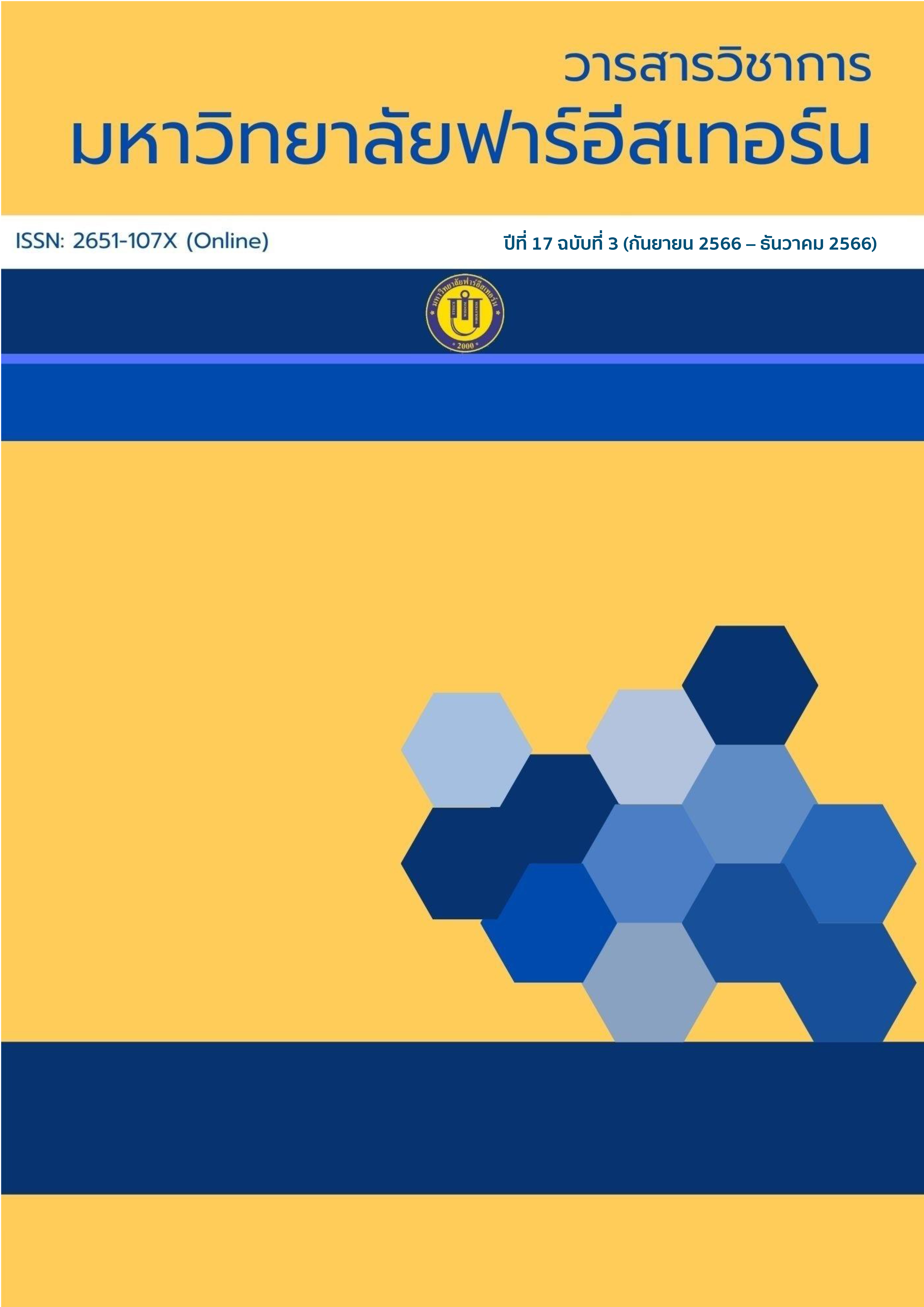The The Experience Provision by Using Kid Thinking Math Game to Promote Mathematical Concepts of Young Children Ban Santisuk School Phayao Province
Main Article Content
Abstract
The objectives of the research are 1) To study the results of organizing an experience using the KID THINKING MATH game to promote mathematical concepts in young children to be effective and 2) To compare mathematical concept scores between before and after the experience using the KID THINKING MATH game. The sample group included young children in Kindergarten 3/2, 16 males, 4 females, totaling 20 people, semester 1. Academic year 2023, Ban Santisuk School, Khun Khuan Subdistrict, Phayao Province, using the Cluster Random Sampling method. Statistics used in data analysis include content validity, mean, standard deviation, and t - test (Dependent Sample) values. Tools Used in the research includes Experience plan and concept assessment form. The results of the research found that the results of organizing experiences using the KID THINKING MATH game to promote mathematical concepts in early childhood children. It was found that the E1/E2 efficiency was equal to 82.29/87.08, which is higher than the standard efficiency criteria set for 80/80. When comparing the mathematics concept scores of early childhood children. Between before and after organizing the experience using the game KID THINKING MATH, the score after organizing the experience was significantly higher than before organizing the experience at the 0.01 level.
Article Details

This work is licensed under a Creative Commons Attribution-NonCommercial-NoDerivatives 4.0 International License.
1. Any views and comments in the Journal of Social Innovation and Lifelong Learning are the authors’ views. The editorial staff have not to agree with those views and it is not considered as the editorial’s responsibility.
2. The responsibility of content and draft check of each article belongs to each author. In case, there is any lawsuit about copyright infringement. It is considered as the authors’ sole responsibility.
3. The article copyright belonging to the authors and The Far Eastern University are copyrighted legally. Republication must be received direct permission from the authors and The Far Eastern University in written form.
References
กรมส่งเสริมการปกครองท้องถิ่น. (2560). แนวการจัดกิจกรรมเตรียม ประสบการณ์ ตามหลักสูตรการศึกษาปฐมวัย สังกัดองค์กรองค์กรปกครองส่วนท้องถิ่น. กรุงเทพมหานคร: โรงพิมพ์ชุมนุมสหกรณ์การเกษตรแห่งประเทศไทยจำกัด.
กระทรวงศึกษาธิการ. (2560). หลักสูตรการศึกษาปฐมวัย พุทธศักราช 2560. กรุงเทพฯ: โรงพิมพ์ชุมนุมสหกรณ์การเกษตรแห่งประเทศไทย จำกัด.
ขนิษฐา บุนนาค. (2562). ทักษะพื้นฐาน คณิตศาสตร์สำหรับเด็กปฐมวัย. https://www.youngciety.com/article/journal/kindergarten-math.html/
ทิศนา แขมมณี. (2560). ศาสตร์การสอนองค์ความรู้เพื่อการจัดกระบวนการเรียนรู้ที่มีประสิทธิภาพ (พิมพ์ครั้งที่ 21). กรุงเทพฯ: โรงพิมพ์แห่งจุฬาลงกรณ์
มหาวิทยาลัย.
ทีชชิ่งทอยส์. (2555). คู่มือการใช้สื่อของเล่นเพื่อพัฒนาเด็กปฐมวัย. กรุงเทพฯ: บริษัท ทีชชิ่งทอยส์ จำกัด.
นาตยา ปิลันธนานนนท์. (2542). การเรียนรู้ความคิดรวบยอด. กรุงเทพฯ: เจ้าพระยาระบบการพิมพ์.
นิธิกานต์ ขวัญบุญ. (2549). การพัฒนาเกมการศึกษาเพื่อเตรียมความพร้อมทางคณิตศาสตร์สำหรับเด็กปฐมวัย [วิทยานิพนธ์ปริญญามหาบัณฑิต, มหาวิทยาลัยศิลปากร].
บุญชม ศรีสะอาด. (2556). วิธีการทางสถิติสำหรับการวิจัย เล่ม 1 (พิมพ์ครั้งที่ 7). กรุงเทพฯ: สุวีรียาสาส์น.
เพจรัฐกุลผู้ช่วยที่ดีที่สุดของครูอนุบาล. (2563). เกมการศึกษาได้มากกว่าความสนุก. https://shorturl.asia/UeXs1/
โรงเรียนบ้านสันติสุข. (2563). การประเมินคุณภาพตามมาตรฐานการศึกษา. พะเยา: สำนักงานเขตพื้นที่การศึกษาประถมศึกษาพะเยาเขต 2.
วิชัย วงษ์ใหญ่ และ มารุต พัฒผล. (2562). การจัดการเรียนรู้เพื่อเสริมสร้างความคิดรวบยอด. กรุงเทพฯ: ศูนย์ผู้นำนวัตกรรมหลักสูตรและการเรียนรู้.
สถาบันส่งเสริมการสอนวิทยาศาสตร์และเทคโนโลยี (สสวท.). (2563). กรอบการเรียนรู้และแนวทางการจัดประสบการณ์การเรียนรู้บูรณาการตามหลักสูตรการศึกษาปฐมวัย พุทธศักราช 2560. กรุงเทพฯ: บริษัท โกโกพริ้นท์ (ไทยแลนด์) จำกัด
สมศักดิ์ สินธุระเวชญ์. (2544). กิจกรรมพัฒนาผู้เรียนคณิตศาสตร์. กรุงเทพฯ: บริษัท สำนักพิมพ์วัฒนาพาณิช จำกัด.
สุพัตรา เลขาวิจิตร. (2563). การจัดประสบการณ์การเรียนรู้โดยใช้เกมการศึกษาและเพลงเพื่อพัฒนาความพร้อมทางคณิตศาสตร์ของเด็กปฐมวัยชั้นอนุบาลปีที่ 2. วารสารเทคโนโลยีและสื่อสารการศึกษาคณะศึกษาศาสตร์ มหาวิทยาลัยมหาสารคาม , 3(8), 9-22. https://so02.tci-thaijo.org
/index.php/etcedumsujournal/article/view/244458
สุมารีย์ ไชยประสพ. (2558). การพัฒนาทักษะพื้นฐานทางคณิตศาสตร์สำหรับเด็กปฐมวัยโดยใช้กิจกรรมเกมการศึกษา โรงเรียนโป่งน้ำร้อนวิทยา [วิทยานิพนธ์ปริญญามหาบัณฑิต, มหาวิทยาลัยราชภัฏเชียงใหม่].
สุวิทย์ มูลคำ และ อรทัย มูลคำ. (2546). 19 วิธีการจัดการเรียนรู้: เพื่อพัฒนาความรู้และทักษะ (พิมพ์ครั้งที่ 4). กรุงเทพฯ: โรงพิมพ์ภาพพิมพ์.
สำนักงานบริหารและพัฒนาองค์ความรู้. (2560). Thailand 4.0 ขับเคลื่อนอนาคตสู่ความมั่นคง มั่งคั่ง ยั่งยืน. วารสาร “ไทยคู่ฟ้า”, 33, 1-44.
สำนักวิชาการและมาตรฐานการศึกษา. (2561). คู่มือหลักสูตรการศึกษาปฐมวัย พุทธศักราช 2560 สำหรับเด็กอายุ 3-6 ปี. กรุงเทพฯ: โรงพิมพ์ชุมนุมสหกรณ์การเกษตรแห่งประเทศไทย จำกัด.
Starfish Labz. (2019). เกมการศึกษาสำคัญอย่างไร. https://www.starfishlabz.com/

